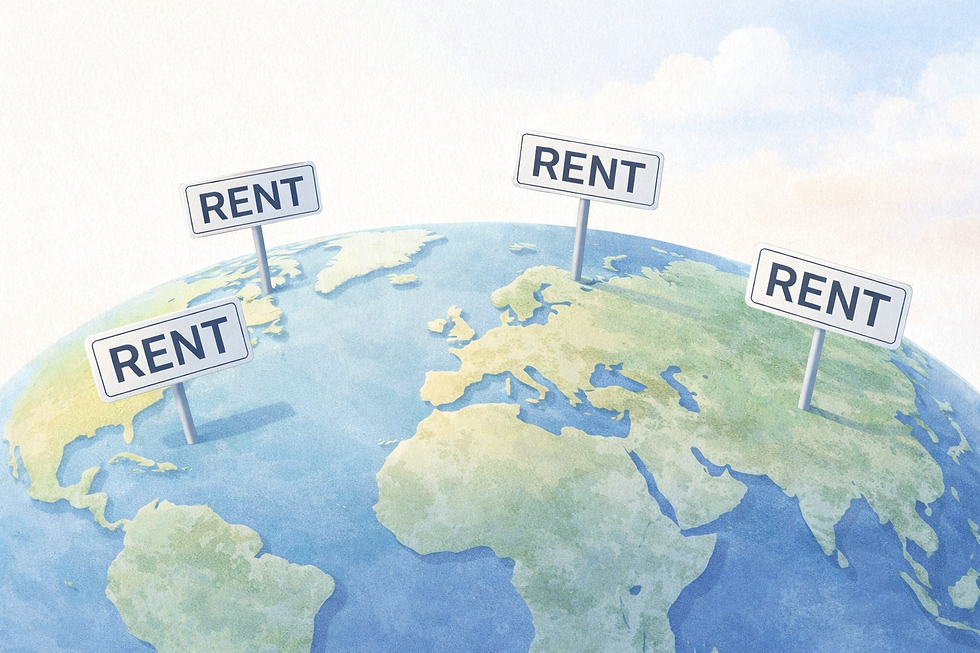A Landlord’s Survival Guide: What to Do When a Tenant Passes Away
- Rich Arzaga

- Feb 20, 2025
- 4 min read
Updated: Dec 14, 2025

As a landlord, you understand that your role goes beyond collecting rent and maintaining the property. You handle everything from repairs and late payments to tenant disputes and evictions. However, one situation that many landlords may not prepare for is a tenant's death. While this may be an unfortunate and challenging experience, knowing how to navigate this sensitive issue legally and emotionally is essential.
Landlords face legal responsibilities, financial challenges, and personal considerations when a tenant dies. Here’s your survival guide to handling this difficult situation with care and respect while protecting your property and financial interests.
1. Secure the Property and Prevent Unauthorized Access
After being informed of a tenant’s death, the first step is to ensure the rental property's security. Taking immediate action is important if you were notified through family members or the tenant’s executor.
Lock the Doors and Windows: To prevent unauthorized entry and potential theft, lock all doors and windows. You may also want to change the locks. Although this might seem drastic, it protects your property and ensures no one who isn't authorized gains access to the unit.
Document Your Actions: If you must enter the property, recording your actions is recommended. You can take photos or even videos to document the condition of the unit and any personal belongings that may be left behind. This documentation will help protect you in case of any disputes in the future.
2. Contact the Executor or Next of Kin
Once the property is secured, your next step is to contact the tenant’s next of kin or the estate executor. This person will handle the deceased tenant’s affairs, including the lease and any personal property left in the unit.
Get Written Notification: It’s important to receive official confirmation of the tenant’s death in writing. This helps ensure that you deal with the appropriate party and gives you the legal standing to proceed with lease termination and property cleanup.
Be Respectful and Patient: Dealing with the death of a loved one is an emotional and often overwhelming experience for the family. Approach the conversation with sensitivity and understanding, acknowledging their grief while discussing the necessary next steps.
3. Review the Lease and Discuss Lease Termination
Depending on the lease agreement, you may need to work with the executor to terminate the lease. Many lease agreements will contain clauses addressing what happens when a tenant dies, but these may vary by state and lease terms.
State Laws Apply: Remember that rental laws vary from state to state. While some states might guarantee payment of rent for a period following a tenant’s death, others might not. For example, some jurisdictions require the next of kin or the tenant’s estate to pay rent for the remaining lease term, while others may only owe a few months’ rent.
Security Deposit and Damages: You may also need to address the security deposit. If the tenant’s estate or next of kin is responsible for paying the remaining rent, this could also cover any necessary property repairs or damages beyond normal wear and tear. However, if the property is left in good condition, you should return the security deposit to the estate under your state’s regulations.
4. Coordinate Belongings Removal and Final Cleanup
Once the lease is terminated and any financial matters are settled, the next step is to arrange for the deceased tenant’s personal belongings to be removed. This can be a delicate process, and it’s crucial to coordinate carefully with the next of kin or executor.
Set Clear Expectations: Work with the deceased tenant’s family to set a timeline for removing their belongings. Giving the family a deadline to remove personal items from the property is reasonable, especially if you plan to re-rent the unit. Be respectful but firm in your approach to avoid prolonged delays.
Final Cleanup: Once the unit is cleared of personal items, ensure the property is cleaned and ready for the next tenant. You may need to hire professional cleaners, especially if a biohazard or the property is left unkempt.
5. Handle the Emotional and Legal Side with Sensitivity
While managing the legal and financial responsibilities of a tenant’s death is important, it’s equally crucial to approach the situation with empathy. Losing a loved one is an emotional and stressful time for the family, and you, as a landlord, are in a unique position to offer support during this challenging process.
Offer Compassion: Recognize that you are dealing with grieving individuals. While you must take care of business matters, keep the lines of communication open and respectful. Your kindness during this time can leave a lasting positive impression and help maintain your reputation as a fair and compassionate landlord.
Know Your Resources: In some cases, landlords might need additional help navigating tenant death's emotional and legal challenges. You may want to consult with legal professionals or property management services to ensure you comply with all regulations and handle the situation appropriately.
Final Thoughts: Moving Forward
Handling a tenant's death is undoubtedly challenging for any landlord. By taking the right steps—securing the property, reviewing the lease agreement, coordinating with the tenant’s family or executor, and addressing both the legal and emotional sides of the situation—you can protect your property and ensure that your responsibilities are met.
It’s also crucial to recognize that each state has specific laws that may impact how you proceed. These should always be considered when dealing with a tenant's death. Consult with a legal expert if you are unsure about any aspect of the process.
In the end, while it is difficult, dealing with tenant death is part of the broader responsibilities of being a landlord. Approaching it thoughtfully and carefully can help you maintain professionalism and compassion while protecting your business interests.




Comments